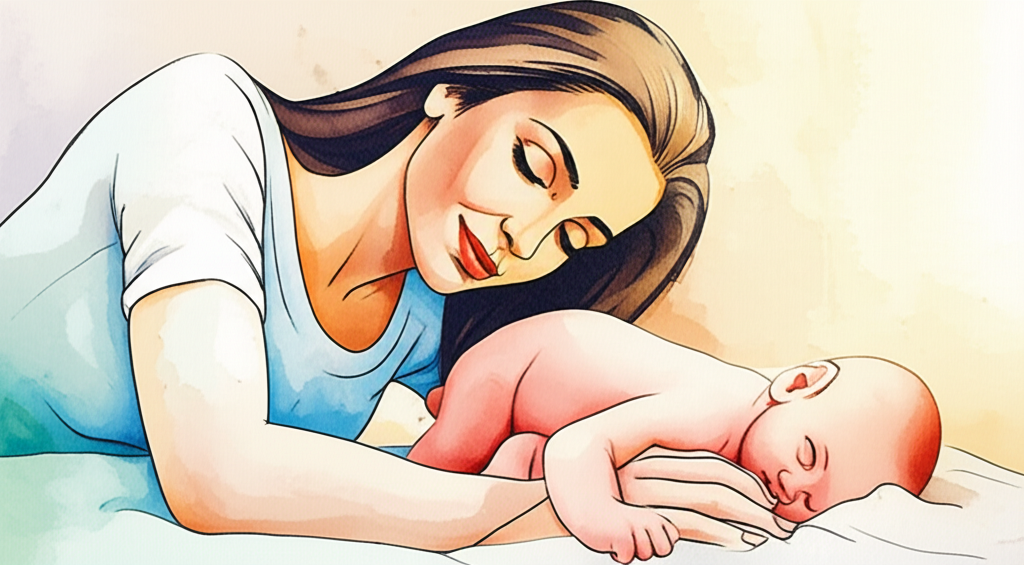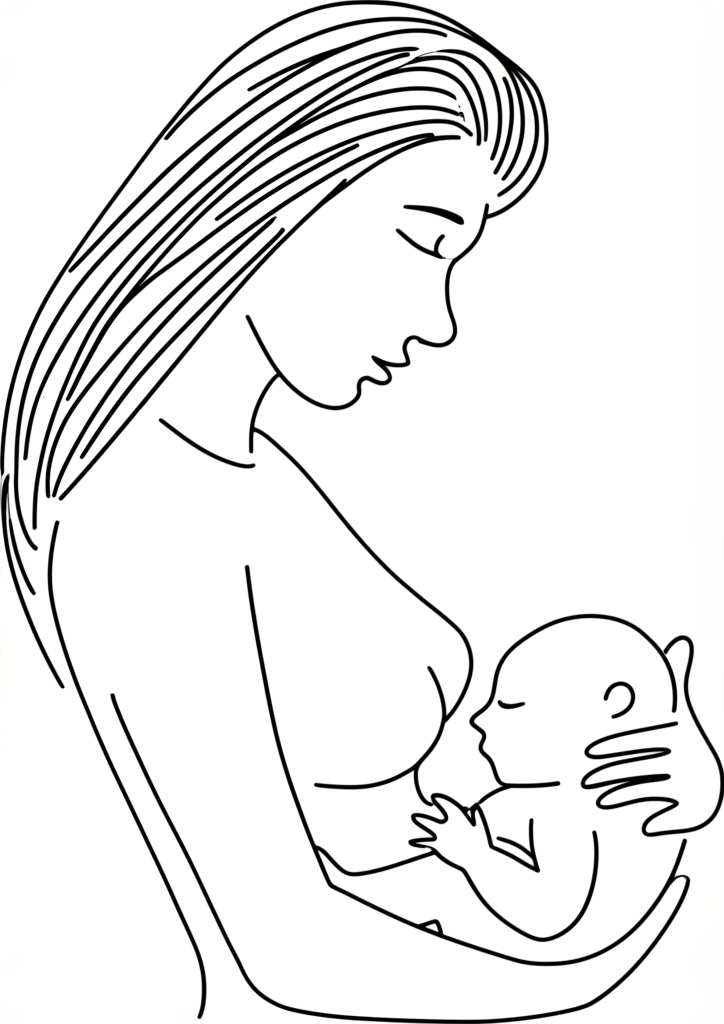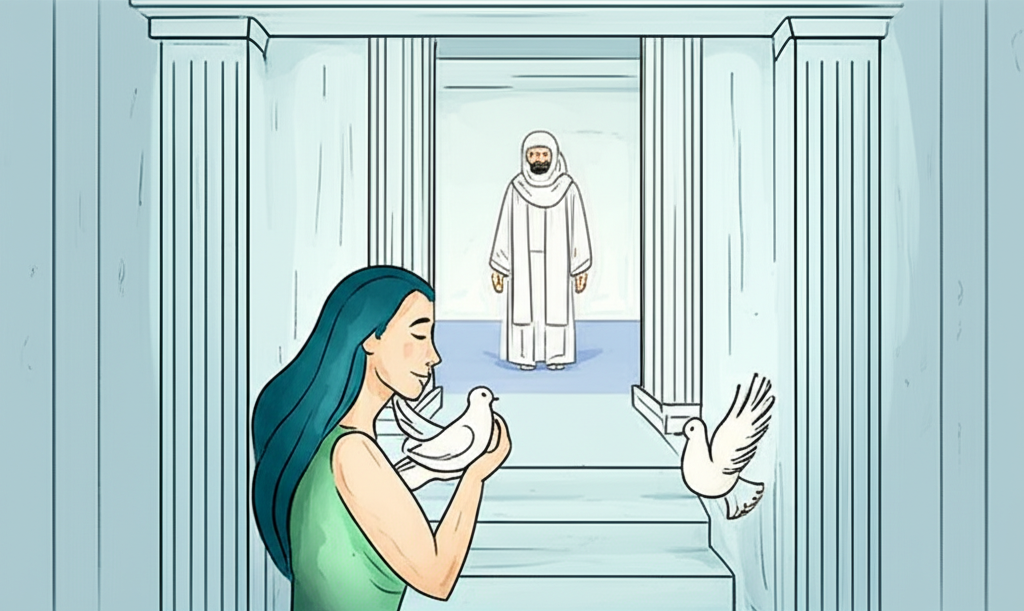Leviticus 12 meaning explained in AI Summary
Purification After Childbirth
- Importance of Ritual Cleanliness: This chapter emphasizes the importance of ritual cleanliness following childbirth. Women were considered ritually unclean for a set period depending on the gender of the newborn.
- Differentiation Based on Gender: The length of the purification period differed based on whether the child was male (40 days) or female (80 days). This distinction may reflect cultural beliefs about childbirth or potential health concerns.
- Sacrificial Offerings: After the purification period, a woman was required to bring a burnt offering and a sin offering to the tabernacle. This act symbolized her reintegration into the community and the restoration of ritual purity.
This chapter outlines the rituals a woman must undergo to become ritually pure after giving birth, emphasizing the sacredness of life and God's order.
Two Different Scenarios:
- Birth of a Son: The mother is considered ritually impure for 7 days, followed by 33 days of purification.
- Birth of a Daughter: The mother is considered ritually impure for 14 days, followed by 66 days of purification.
Reasons for Impurity:
The text doesn't explicitly state the reason for impurity, but it's generally understood as a way to acknowledge the power of life and death surrounding childbirth. It's not about hygiene but about spiritual transition and re-entering the community after a significant life event.
Purification Process:
After the initial period of impurity, the mother must bring two offerings to the priest at the entrance of the Tent of Meeting:
- A burnt offering: Symbolizing dedication and atonement.
- A sin offering: Symbolizing purification from unintentional transgressions.
Significance:
- Gender Distinction: The longer purification period for daughters might reflect societal views at the time, potentially linking it to menstrual cycles or cultural perceptions.
- Holiness of Life: The rituals emphasize the sacredness of life and the awe surrounding childbirth.
- Reintegration into the Community: The purification process allows the mother to re-enter the community and participate fully in religious life.
Modern Interpretation:
While these rituals are no longer practiced in most Jewish denominations, they offer valuable insights into ancient Israelite beliefs about:
- The power of childbirth
- The importance of ritual purity
- The relationship between the sacred and the everyday
It's crucial to approach these verses with historical and cultural sensitivity, understanding their context within the broader Levitical law.
Leviticus 12 bible study ai commentary
Leviticus 12 addresses the ritual impurity associated with childbirth, a natural and blessed process that nonetheless touches on the profound biblical themes of life, death, blood, and the fallen state of humanity inherited since the Garden of Eden. The chapter outlines the required periods of separation and the necessary sacrifices for a mother's purification, cleansing her not from sin, but from a state of ritual uncleanness, allowing her to be fully restored to worship in the Tabernacle community.
Leviticus 12 context
In the Ancient Near East, childbirth was often surrounded by magical rites and fears of demonic spirits. The laws in Leviticus are a polemic against this; they are theological, not superstitious. The focus is on God's holiness and the line between the sacred and the common. Uncleanness (ṭāmē') is not sinfulness but a state of ritual impurity. It pertains to things that cross the boundary between life and death (childbirth, corpses, bodily emissions, skin disease), which makes a person temporarily unfit to enter the sacred space of the Tabernacle where God’s perfect life dwells. This law is a physical reminder of a spiritual reality: life in a fallen world is messy and distinct from the perfect holiness of God.
Leviticus 12:1-2
Then the LORD spoke to Moses, saying, “Speak to the people of Israel, saying, If a woman conceives and bears a male child, then she shall be unclean seven days. As at the time of her menstruation, she shall be unclean.
In-depth-analysis
- The process begins with God speaking, establishing this as divine law, not human custom.
- Conceives and bears a male child: Childbirth, a fulfillment of God's "be fruitful and multiply" mandate (Gen 1:28), paradoxically renders the mother unclean.
- Unclean seven days: The Hebrew word for unclean is ṭāmē'. This state of ritual impurity is not about hygiene or being sinful, but about being incompatible with God's sacred space. The blood involved in birth is a potent symbol of both life and, in a fallen world, mortality.
- As at the time of her menstruation: This directly links the uncleanness of childbirth to the laws of menstrual purity (Lev 15:19-24). Both involve the flow of blood, the biblical symbol for life, and represent the life-and-death cycle from which God's eternal nature is separate. Seven days signifies a complete, albeit temporary, period of separation.
Bible references
- Leviticus 15:19: "When a woman has a discharge, and the discharge in her body is blood, she shall be in her menstrual impurity for seven days..." (The direct legal parallel).
- Psalm 51:5: "Behold, I was brought forth in iniquity, and in sin did my mother conceive me." (A theological reflection on the fallen state into which every human is born).
- Genesis 1:28: "And God blessed them. And God said to them, 'Be fruitful and multiply...'" (Highlights the paradox: God's blessing of procreation is now intertwined with the curse and ritual uncleanness).
Cross references
Gen 3:16 (the curse of pain in childbearing); Lev 11:1-47 (distinctions between clean/unclean animals); Rom 5:12 (sin and death entering the world).
Leviticus 12:3
And on the eighth day the flesh of his foreskin shall be circumcised.
In-depth-analysis
- Eighth day: This timing is highly significant. Following the seven days of the mother's initial impurity, the eighth day symbolizes a new beginning. The son is officially brought into the covenant people through circumcision.
- Circumcision: This is the sign of the Abrahamic Covenant, marking the child as belonging to God's people. It happens during the mother's period of ritual uncleanness, showing a distinction between her temporary state and the child's permanent covenant identity.
Bible references
- Genesis 17:12: "He who is eight days old among you shall be circumcised. Every male... so shall my covenant be in your flesh an everlasting covenant." (The origin of the command).
- Luke 2:21: "And at the end of eight days, when he was circumcised, he was called Jesus..." (Shows Jesus, though sinless, submitted to the covenant sign).
- Colossians 2:11-12: "In him also you were circumcised with a circumcision made without hands... having been buried with him in baptism..." (Explains circumcision as a physical type of the spiritual reality of new life in Christ).
Cross references
Rom 2:28-29 (circumcision of the heart); Phil 3:3 (true circumcision is spiritual); Gen 21:4 (Isaac's circumcision).
Leviticus 12:4
Then she shall continue for thirty-three days in the blood of her purifying. She shall not touch any holy thing, nor come into the sanctuary, until the days of her purifying are completed.
In-depth-analysis
- Thirty-three days: This second phase brings the total period of separation from the sanctuary to 40 days (7 + 33). The number 40 in the Bible often represents a period of testing, transition, or purification (e.g., the Flood, Moses on Sinai, Israel in the wilderness, Jesus' temptation).
- Blood of her purifying: During this time, the bleeding has likely subsided, but her status remains. She is considered clean enough for daily life but not holy enough for sanctuary worship.
- Shall not touch any holy thing: This explicitly defines the boundary. Her uncleanness is not social or hygienic but ritual; it concerns her access to the sacred things associated with God's dwelling place.
Bible references
- Luke 2:22: "And when the days of their purification according to the Law of Moses were completed, they brought him up to Jerusalem to present him to the Lord" (The direct fulfillment of this period by Mary and Joseph).
- Leviticus 7:20: "But the person who eats of the flesh of the sacrifice of the LORD's peace offerings while an uncleanness is on him, that person shall be cut off..." (Shows the seriousness of mixing the holy and the unclean).
- Numbers 19:13: "Whoever touches a dead person... and does not cleanse himself, defiles the tabernacle of the LORD..." (Demonstrates how uncleanness, especially from death, defiles the sacred space).
Cross references
Lev 15:25-30 (laws for irregular bleeding); Num 18:11 (definition of holy things).
Leviticus 12:5
But if she bears a female child, then she shall be unclean two weeks, as in her menstruation. And she shall continue in the blood of her purifying for sixty-six days.
In-depth-analysis
- Bears a female child: The procedure is the same, but the timeline is exactly doubled: 14 days of initial impurity and 66 days of further purification, for a total of 80 days.
- Polemics: This verse is often misinterpreted as viewing women as inferior. However, a strong theological explanation links this to the narrative of Genesis 3. Eve was the first to sin, leading humanity into the Fall. The birth of another female (a potential "Eve," a future life-bearer) prompts a longer period of reflection on the fall and its consequences. The uncleanness is not tied to the baby girl's value but to the mother's role as the channel of life in a fallen world, with this rule serving as a profound reminder of humanity's source of sin and need for redemption. It highlights the gravity of the woman's role in the story of creation and fall.
Bible references
- Genesis 3:16: "To the woman he said, 'I will surely multiply your pain in childbearing; in pain you shall bring forth children...'" (The doubling of the time reflects a deepening of the consequence of the Fall).
- 1 Timothy 2:14-15: "And Adam was not deceived, but the woman was deceived and became a transgressor. Yet she will be saved through childbearing..." (A NT passage that links the woman, deception, and salvation through childbearing, showing a continued theological thread).
Leviticus 12:6-7
And when the days of her purifying are completed, whether for a son or for a daughter, she shall bring to the priest at the entrance of the tent of meeting a lamb a year old for a burnt offering, and a pigeon or a turtledove for a sin offering, and he shall offer it before the LORD and make atonement for her. Then she shall be clean from the flow of her blood. This is the law for her who bears a child, either male or female.
In-depth-analysis
- A lamb for a burnt offering ('ōlāh): This offering signified complete consecration and atonement, acknowledging God's sovereignty over life.
- A pigeon or a turtledove for a sin offering (ḥaṭṭā't): Critically, this is not an offering for the sin of giving birth. Childbirth is a blessing. Rather, it is a purification offering to cleanse the ritual defilement caused by contact with the blood/death element of birth in a fallen world. It resolves her state of uncleanness.
- Make atonement (kipper) for her: The priestly act of sacrifice ritually restores her to a state of wholeness and renewed access to God.
- She shall be clean (ṭāhērāh): The law provides the complete path from a state of uncleanness back to a state of ritual cleanness, enabling full participation in community worship.
Bible references
- Hebrews 9:22: "Indeed, under the law almost everything is purified with blood, and without the shedding of blood there is no forgiveness of sins." (Explains the principle behind all atoning sacrifices).
- 2 Corinthians 5:21: "For our sake he made him to be sin who knew no sin, so that in him we might become the righteousness of God." (Jesus as the ultimate sin offering, cleansing not just ritual but moral impurity).
- Hebrews 10:10: "...we have been sanctified through the offering of the body of Jesus Christ once for all." (Contrasts the repeatable sacrifices of the Law with the finality of Christ's sacrifice).
Cross references
Lev 1:10-13 (law of the burnt offering); Lev 4:32-35 (law of the sin offering).
Leviticus 12:8
And if she cannot afford a lamb, then she shall take two turtledoves or two young pigeons, one for a burnt offering and the other for a sin offering. And the priest shall make atonement for her, and she shall be clean.”
In-depth-analysis
- If she cannot afford a lamb: This is a profound "poverty clause," demonstrating God's compassion. He makes His laws of purification and restoration accessible to all, regardless of economic status. The obedience and heart of the worshipper are more important than the monetary value of the animal.
- Two turtledoves or two young pigeons: The substitution maintains the theological categories (a burnt offering and a sin/purification offering) even with less expensive animals. This reveals God's justice and grace.
Bible references
- Luke 2:24: "...and to offer a sacrifice according to what is said in the Law of the Lord, 'a pair of turtledoves, or two young pigeons.'" (This is the most powerful NT connection, showing that Mary and Joseph were poor and followed this exact provision, highlighting the humble circumstances of the Savior's birth).
- Leviticus 5:7: "But if he cannot afford a lamb, then he shall bring to the LORD for his trespass... two turtledoves or two young pigeons..." (Shows this poverty provision was a consistent principle in God's law).
- 2 Corinthians 8:9: "For you know the grace of our Lord Jesus Christ, that though he was rich, yet for your sake he became poor, so that you by his poverty might become rich." (The family who used the "poor man's sacrifice" brought forth the one who makes all spiritually rich).
Cross references
Lev 1:14-17 (law for bird offerings); Lev 14:21-22 (poverty provision for leper's cleansing).
Leviticus 12 analysis
- Christological Fulfillment: Jesus was born "under the Law" (Gal 4:4). His own mother participated in this purification ritual, demonstrating that the system that pointed to the need for cleansing was fulfilled by the one who was born through it. The birth that made His mother temporarily unclean was the very birth that would bring ultimate cleansing to all humanity.
- Life from Death: Childbirth is the supreme example of God’s blessing of life. Yet, in a fallen world, it is tainted by pain (Gen 3:16) and blood, a symbol of death. These laws forced the Israelites to hold two truths in tension: birth is a profound gift, but it occurs within a creation that groans for redemption from death.
- Symbolic Numbers: The chapter is structured around key biblical numbers. 7 represents divine completion or perfection (the initial week of uncleanness). 8 symbolizes a new beginning (the day of circumcision). 40 (7+33) represents a period of trial and transition leading to a new state.
- A "Gospel" Interpretation of the Doubled Time: Instead of viewing the daughter's 80 days as punitive, some see a hidden grace. For a male child (day 8), circumcision, the sign of the covenant that includes shedding blood, happens early. For the female child, no blood is shed as a sign of the covenant. Her extended 80-day period can be seen as a time of protected nearness to her mother, a doubling of the period of grace and rest before a full return to society, without an associated covenantal bloodletting ceremony.
Leviticus 12 summary
Leviticus 12 establishes the laws of ritual purification for a mother after giving birth, linking the blessed event of new life with the theological reality of a world subject to death and decay since Genesis 3. It prescribes specific timeframes of separation and concludes with atoning sacrifices, which mercifully accommodate the poor, that restore the mother to full participation in sanctuary worship. The entire ritual was fulfilled by Mary, the mother of Jesus, highlighting the humble beginnings of the one who would provide the ultimate, final purification for all.
Leviticus 12 AI Image Audio and Video










Leviticus chapter 12 kjv
- 1 And the LORD spake unto Moses, saying,
- 2 Speak unto the children of Israel, saying, If a woman have conceived seed, and born a man child: then she shall be unclean seven days; according to the days of the separation for her infirmity shall she be unclean.
- 3 And in the eighth day the flesh of his foreskin shall be circumcised.
- 4 And she shall then continue in the blood of her purifying three and thirty days; she shall touch no hallowed thing, nor come into the sanctuary, until the days of her purifying be fulfilled.
- 5 But if she bear a maid child, then she shall be unclean two weeks, as in her separation: and she shall continue in the blood of her purifying threescore and six days.
- 6 And when the days of her purifying are fulfilled, for a son, or for a daughter, she shall bring a lamb of the first year for a burnt offering, and a young pigeon, or a turtledove, for a sin offering, unto the door of the tabernacle of the congregation, unto the priest:
- 7 Who shall offer it before the LORD, and make an atonement for her; and she shall be cleansed from the issue of her blood. This is the law for her that hath born a male or a female.
- 8 And if she be not able to bring a lamb, then she shall bring two turtles, or two young pigeons; the one for the burnt offering, and the other for a sin offering: and the priest shall make an atonement for her, and she shall be clean.
Leviticus chapter 12 nkjv
- 1 Then the LORD spoke to Moses, saying,
- 2 "Speak to the children of Israel, saying: 'If a woman has conceived, and borne a male child, then she shall be unclean seven days; as in the days of her customary impurity she shall be unclean.
- 3 And on the eighth day the flesh of his foreskin shall be circumcised.
- 4 She shall then continue in the blood of her purification thirty-three days. She shall not touch any hallowed thing, nor come into the sanctuary until the days of her purification are fulfilled.
- 5 'But if she bears a female child, then she shall be unclean two weeks, as in her customary impurity, and she shall continue in the blood of her purification sixty-six days.
- 6 'When the days of her purification are fulfilled, whether for a son or a daughter, she shall bring to the priest a lamb of the first year as a burnt offering, and a young pigeon or a turtledove as a sin offering, to the door of the tabernacle of meeting.
- 7 Then he shall offer it before the LORD, and make atonement for her. And she shall be clean from the flow of her blood. This is the law for her who has borne a male or a female.
- 8 'And if she is not able to bring a lamb, then she may bring two turtledoves or two young pigeons?one as a burnt offering and the other as a sin offering. So the priest shall make atonement for her, and she will be clean.' "
Leviticus chapter 12 niv
- 1 The LORD said to Moses,
- 2 "Say to the Israelites: 'A woman who becomes pregnant and gives birth to a son will be ceremonially unclean for seven days, just as she is unclean during her monthly period.
- 3 On the eighth day the boy is to be circumcised.
- 4 Then the woman must wait thirty-three days to be purified from her bleeding. She must not touch anything sacred or go to the sanctuary until the days of her purification are over.
- 5 If she gives birth to a daughter, for two weeks the woman will be unclean, as during her period. Then she must wait sixty-six days to be purified from her bleeding.
- 6 "?'When the days of her purification for a son or daughter are over, she is to bring to the priest at the entrance to the tent of meeting a year-old lamb for a burnt offering and a young pigeon or a dove for a sin offering.
- 7 He shall offer them before the LORD to make atonement for her, and then she will be ceremonially clean from her flow of blood. "?'These are the regulations for the woman who gives birth to a boy or a girl.
- 8 But if she cannot afford a lamb, she is to bring two doves or two young pigeons, one for a burnt offering and the other for a sin offering. In this way the priest will make atonement for her, and she will be clean.'?"
Leviticus chapter 12 esv
- 1 The LORD spoke to Moses, saying,
- 2 "Speak to the people of Israel, saying, If a woman conceives and bears a male child, then she shall be unclean seven days. As at the time of her menstruation, she shall be unclean.
- 3 And on the eighth day the flesh of his foreskin shall be circumcised.
- 4 Then she shall continue for thirty-three days in the blood of her purifying. She shall not touch anything holy, nor come into the sanctuary, until the days of her purifying are completed.
- 5 But if she bears a female child, then she shall be unclean two weeks, as in her menstruation. And she shall continue in the blood of her purifying for sixty-six days.
- 6 "And when the days of her purifying are completed, whether for a son or for a daughter, she shall bring to the priest at the entrance of the tent of meeting a lamb a year old for a burnt offering, and a pigeon or a turtledove for a sin offering,
- 7 and he shall offer it before the LORD and make atonement for her. Then she shall be clean from the flow of her blood. This is the law for her who bears a child, either male or female.
- 8 And if she cannot afford a lamb, then she shall take two turtledoves or two pigeons, one for a burnt offering and the other for a sin offering. And the priest shall make atonement for her, and she shall be clean."
Leviticus chapter 12 nlt
- 1 The LORD said to Moses,
- 2 "Give the following instructions to the people of Israel. If a woman becomes pregnant and gives birth to a son, she will be ceremonially unclean for seven days, just as she is unclean during her menstrual period.
- 3 On the eighth day the boy's foreskin must be circumcised.
- 4 After waiting thirty-three days, she will be purified from the bleeding of childbirth. During this time of purification, she must not touch anything that is set apart as holy. And she must not enter the sanctuary until her time of purification is over.
- 5 If a woman gives birth to a daughter, she will be ceremonially unclean for two weeks, just as she is unclean during her menstrual period. After waiting sixty-six days, she will be purified from the bleeding of childbirth.
- 6 "When the time of purification is completed for either a son or a daughter, the woman must bring a one-year-old lamb for a burnt offering and a young pigeon or turtledove for a purification offering. She must bring her offerings to the priest at the entrance of the Tabernacle.
- 7 The priest will then present them to the LORD to purify her. Then she will be ceremonially clean again after her bleeding at childbirth. These are the instructions for a woman after the birth of a son or a daughter.
- 8 "If a woman cannot afford to bring a lamb, she must bring two turtledoves or two young pigeons. One will be for the burnt offering and the other for the purification offering. The priest will sacrifice them to purify her, and she will be ceremonially clean."
- Bible Book of Leviticus
- 1 Laws for Burnt Offerings
- 2 Laws for Grain Offerings
- 3 Laws for Peace Offerings
- 4 Sacrifies for Sin
- 5 Laws for Guilt Offerings
- 6 The Priests and the Offerings
- 7 Law of the trespass offering
- 8 Consecration of Aaron and His Sons
- 9 The Lord Accepts Aaron's Offering
- 10 The Death of Nadab and Abihu
- 11 Clean and unclean Animals
- 12 Purification After Childbirth
- 13 Laws About Leprosy
- 14 Laws for Cleansing Lepers
- 15 Sperm Discharge and Menstruation cycle
- 16 Day of Atonement
- 17 The Place of Sacrifice
- 18 Unlawful Sexual Relations
- 19 Levitical Laws for Levites
- 20 Punishment for Child Sacrifice
- 21 Holiness and the Priests
- 22 Acceptable Offerings
- 23 The Feasts of the Lord
- 24 The Lamps
- 25 Year of Jubilee
- 26 Blessings for Obedience
- 27 Laws About Vows